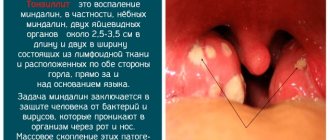Home > Baby > Newborn health >
Why does a baby suck his fist or fingers? Is this action considered a bad habit? Modern psychologists and pediatricians do not see anything dangerous or harmful in thumb sucking: it is a manifestation of the baby’s natural instinct. Let's consider the question of the dangers and benefits of sucking in detail.
- 1 Why does a baby put his fingers in his mouth?
- 2 Other causes of fist sucking
- 3 Harm or benefit for the baby?
- 4 How to wean your child off the fist
- 5 What not to do
Why does a baby put his fingers in his mouth?
The opinion of experts on this matter is clear - satisfaction of the sucking reflex. The baby is accustomed to taking fingers and fists into his mouth even in intrauterine existence. Psychologically, this is perceived as a memory of a carefree period under the protection of the mother’s body.
On the other hand, the baby sucks his fist for a reason: the output of three powerful receptors is concentrated in the mouth. The nasopharyngeal, vagus and ternary nerves are three fundamental mechanisms for the development of the baby’s body, which provide:
- brain development;
- normal digestion;
- absorption of nutrients;
- psychological comfort.
During breastfeeding, simultaneous development of the baby’s body occurs due to the activation of the activity of these receptors. If the child does not breastfeed, he is offered milk in a bottle with a nipple. Thus, the sucking instinct is partially satisfied.
Why does a breastfed baby also suck his thumb and fist? This may indicate that the mother is weaning him too early. The child was unable to fully satisfy the need for sucking, so he pulls his fist into his mouth.
Why does your baby suck his thumb?
- In infancy, a child begins to suck his thumb for two reasons: when he is hungry, and when he needs to satisfy the sucking instinct.
- Older children thus try to calm themselves down.
- And for some babies, thumb sucking is a sign that they lack parental attention, love, and support.
Usually, when a toddler reaches 3 years of age, he gets rid of the habit of thumb sucking on his own. If this does not happen, parents should make some efforts to help him with this.
After all, there is nothing useful in such a childish addiction. Quite the contrary.
The habit of thumb sucking in infants is most likely associated with errors in diet and daily routine. Psychological reasons predominate in preschoolers and adolescents
Other causes of fist sucking
There are several other reasons that encourage a baby to put his finger in his mouth. These include:
- teething;
- lack of mother's attention;
- way to calm down;
- boredom.
When teething, the baby will pull not only a finger or fist into his mouth, but also any objects at hand. This enthusiasm can be explained by the desire to scratch the gums. It is much worse if a child sucks a finger or fist due to lack of attention from the mother. With this simple action he simply calms himself down.
Here the main role is played by the fact of remembering the intrauterine period, when he was comfortable and cozy. A natural self-defense mechanism is triggered. Older children may put their finger in their mouth simply out of boredom: it serves as entertainment.
Sometimes older children use the sucking reflex to calm down when nervous. A finger in the mouth is a symbol of protection and peace. Psychologists have noticed that in some adults, under nervous stress, the memory of intrauterine existence is triggered - they lie down in the fetal position, curling up into a ball.
Bad advice, or what not to do
Often, parents, once again seeing a finger in a child’s mouth, slap his hand or scold him. But this is wrong - the more often you discipline your children, the stronger the habit will become. There is also no need to try to shame the child, this will only agitate him once again. And childhood stress is the root of future neuroses.
Do not put harmful products on your child's hands. It is often recommended to rub children's fingers with red pepper. However, it can easily get into your eyes and cause severe irritation. Soap is another bad tip. Hands smeared with a modern chemical product will definitely end up in the mouth, and the child and mother will end up in the hospital.
Do not restrain the child's hands. There are special silicone bracelets that cover children's most favorite finger - the thumb. This, however, has a bad effect on the mental state of children.
There is no need to run to your child as soon as he starts sucking his thumb. Children quickly start using this to get their parents' attention.
How to wean a child off the bottle? Little tricks from experienced mothers. How and when should you wean your child off diapers? Find out from our article.
Harm or benefit for the baby?
We have looked at the benefits of the sucking instinct. What is the harm? The baby begins to pull his fist into his mouth when he learns to coordinate his movements. This happens by the age of three months: this is when the fist and finger enter his mouth.
Satisfying the sucking instinct between the ages of three months and one year is not harmful or dangerous.
However, many parents strive to wean their child from this habit, which is harmful from their point of view.
If a baby under two years old sucks his thumb, there will be no harm from it. But strengthening this habit and the need to suck fingers at an older age can provoke dental problems. At the age of five, a child’s teeth begin to change, and fist or finger sucking will negatively affect the formation of the bite.
How to break the habit of thumb sucking
- If we are talking about a baby under one year old, try increasing the sucking time. You can simply offer the breast to the baby more often and hold it longer (thirty to forty minutes). It is more difficult with artificial ones - you will have to choose a pacifier from which it will be quite difficult to suck, in this case the baby will need more time to absorb the same portion of the mixture than before. Ideally, this should take about twenty minutes. It may be worth adding another feeding; it will disappear over time.
- If your baby is no longer an infant and sucks primarily for self-soothing, find other ways to soothe him. For example, if he is upset, teach him to express his feelings in words, hug him, caress him, read an interesting book together. Sometimes children put their fingers in their mouth in some repetitive situation - for example, while watching TV. In this case, find an adequate replacement - give him a small rubber ball or another toy that can be crushed with your fingers.
- It is important to keep your hands busy. Speech therapists and psychologists get tired of repeating the benefits of developing fine motor skills - this is very important for speech development. Let the child tinker with clay, pebbles, sand, assemble a construction set from fairly small parts, put together mosaics or puzzles.
- The little fashionista will appreciate her first “real” manicure, just like her mother’s. Perhaps she won’t want to spoil such beauty?
- Sometimes a visit to the dentist can help and tell your child about the dangers of thumb sucking. This is a person who is quite authoritative for the baby, and he will confirm that parental demands are not an empty whim.
- Focus your child's attention on the fact that once he stops thumb sucking, he will be a full grown adult. This habit is permissible only for the smallest, but for such a respectable young man or adult girl it is simply unacceptable. By the way, most children actually wean themselves from this habit between the ages of two and four years.
Inessa Smyk
How to wean a child off the fist
We have found out the mechanism of fist sucking: satisfaction of instinct. To wean your baby from putting his fist in his mouth, you need to provide him with the opportunity to pump during feeding. For this:
- extend breastfeeding time;
- breastfeed your baby more often;
- change nipples on the bottle more often;
- do not leave the baby alone for a long time;
- Protect your baby from stress.
A baby who is not rushed during breastfeeding is less likely to put his fingers in his mouth. Usually, the baby is satisfied with milk in 10 or 15 minutes, the rest of the time he just sucks for pleasure. Do not stop him from enjoying this procedure: he satisfies his instinct.
If a child is given breastfeeding not according to a schedule, but on demand, he does not need fist sucking. A strict feeding schedule does not always pay off and can lead to chronic stress from unmet needs.
Artificial babies should often replace old nipples with new, tighter ones. If the baby absorbs a portion of the formula in 12-15 minutes, the sucking instinct will not be satisfied. A tight nipple forces the baby to work to obtain milk, which ensures a longer feeding process. However, you should not offer very tight nipples: the baby gets tired quickly and remains half-starved.
What to do when your baby's gums itch? During this period, offer him special rodents; he will be happy to use an interesting toy and pull it into his mouth.
Sucking reflex
By the way, one observant mother noticed an interesting thing. Her son is on a mixed diet - that is, he is fed formula from a bottle along with breast milk. So, the child copes with the bottle much faster than with the mother’s breast, and after that he immediately puts his fist into his mouth. This example is a vivid illustration of the fact that thumb sucking is required by an infant precisely in order to satisfy the sucking reflex. In babies whose mother breastfeeds for a long time (and not according to a regimen, but on demand), such a habit, as a rule, is not observed.
The fact is that for an infant, the concepts of “suck” and “exist” are very close. They suck not only for saturation, but also for development. Studies have shown that when sucking, natural processes that have been established for centuries are launched: nutrients are absorbed, digestion improves, the brain develops, and the child feels psychological comfort.
What not to do
Under no circumstances should you tie your baby’s hands or scold him for his finger! These measures cause active opposition on the part of the child and do not wean him off the finger. Grandma's old "bitter" finger method may work, but there is a danger of harming the baby's stomach.
In addition to the discomfort and moral damage from the “bitter” finger, there is another reason not to use this method. The baby can scratch his eye with his finger! How much suffering will this cause the baby? Therefore, such a method is simply unacceptable in a civilized society.
Instead of restrictions, tying your hands and bitter ointments on your fists and fingers, eliminate the cause of fist sucking! What this reason could be, the mother must figure out for herself. If the instinct is unsatisfied, prolong feeding; if there is stress, soothe; if the gums are scratched, give a rubber teether.
Try to give your baby more attention, affection and tenderness. Often, the rooting of the habit of sucking fingers up to five, or even seven, years is facilitated by a nervous situation in the house and a lack of affection from the mother. Remember that a finger in the mouth is a symbol of security and peace for the child.
Useful tips, or Knight's move
It is better to switch the attention of a small child from the finger to the pacifier - you can take it away later, and children wean themselves off the pacifier more easily. If it doesn’t work, try dipping the pacifier in honey. By the way, it is also a good antiseptic. If children have wounds or ulcers in their mouths, this pacifier will help them heal faster.
It is easier to wean a child from sucking his thumb at 4 years old with a carrot than with a stick. At this age, he is already quite aware of himself and really wants to finally become an adult. Tell your child that as they get older, they will be stronger, smarter, and will stop thumb sucking. At this age, it is necessary to wean, because at the age of 4–5 years, children usually begin to form permanent teeth. Living fingers in the mouth can ruin the bite, and microbes can ruin the intestines.
- Aloe juice. You can smear the finger that your child likes with agave juice. Children don't like it, it's very bitter. In this case, there is no harm, even if the child rubs his eyes. You can also find special harmless ointments in pharmacies.
- Get a massage. This option is good for babies - they just need stimulation in the mouth area. When it is not enough, finger sucking begins. Therefore, if you massage your child’s lips and gums every day, the bad habit will go away much faster.
- Girls over 3 years old can get a children's manicure. For this, you can use any children's varnish, but a special one is also sold - “Nekusayka”. Tell your daughter that a woman, even a small one, should be beautiful and well-groomed. Children love to imitate their elders so much that a neat manicure on their mother will be the best incentive for a girl to stop putting her hands in her mouth. You just need to tell your daughter that cosmetics deteriorate in the mouth.
- You can wean a child from thumb sucking at 2 years old with healthy but tasteless foods. Rarely does a child love, for example, sweet peppers or spinach. Take a vegetable or herbs, preferably with a pronounced aroma. It is imperative that your child does not like the taste. Grind selected vegetables into porridge and spread on children's hands. The child will have only two options: stop sucking his thumb or get accustomed to some useful product.
- Give your child something to grab. All sorts of ringing, rustling and squeaking toys attract children's attention and distract them from their fingers. Let your child always have something interesting at hand. If your children are happy with life, surrounded by patience and love, they have something to do and someone to socialize with, bad habits will go away on their own.
How to recognize and treat stomatitis in a child - video
Recommendations from Dr. Komarovsky on how to detect the presence of stomatitis in time and treat it correctly.
Lack of proper treatment of mild forms of stomatitis in children develops into complex and chronic forms. It is more difficult to fight such diseases, so at the first suspicion you need to contact a specialist for help. Frequent stomatitis in a child indicates other problems with the body. Often pain increases due to a weak immune system.
Drugs for stomatitis in children
As a rule, hospitalization of the patient when an inflammatory process in the oral cavity is detected is not required. Treatment of stomatitis in a child at home, following the doctor’s recommendations, will be effective and successful.
In childhood, anti-inflammatory and wound-healing agents are used for local treatment of the oral cavity. When used in combination as prescribed by a doctor, they help quickly normalize the child’s condition.
- Metrogil denta . An antimicrobial agent with two active antibacterial components in its composition. It is applied to the affected areas of the mucous membranes in a thin layer twice a day. Treatment is continued for up to ten days.
- Holisal . Gel for local treatment of the oral cavity, which has anti-inflammatory and analgesic effects. The anesthetic effect can last up to eight hours, and it can be used before meals to reduce pain.
- Kalgel . A drug with analgesic and antimicrobial effects, approved for use in children from three months. Apply a thin layer to the affected area of the mouth and rub in gently. Use up to six times a day.
- Chamomile decoction . Has an anti-inflammatory effect. In complex treatment, it accelerates wound healing and recovery.
“There are many drugs for the treatment of stomatitis in childhood,” added Igor Repin. — Some have an antiseptic effect, that is, they suppress the development of pathogenic microflora. Others accelerate wound healing, while others isolate ulcerative lesions from food exposure. With the right choice of therapy, the disease goes away quite quickly - within a week or 10 days.”
There is no specific prevention of the disease. But it is obvious that compliance with hygiene rules is an important factor in protecting against stomatitis in childhood. Therefore, despite the desire to allow the child to freely explore the world and objects around him, it is important to monitor the cleanliness of these objects.
Do not allow your child to put dirty toys in his mouth; teach him to wash his hands before eating, after using the toilet, and when returning home from the street. Monitor the health of your baby's teeth, and if any symptoms that cause concern appear, consult a doctor. Your main assistants in the treatment of stomatitis in a child should be pediatricians and dentists, and not personal experience and especially the instructions of older relatives.
Physiology or psychology?
Before deciding whether this is good or bad, let's find out what reasons make a baby want to suck a finger or fist. Why does a child keep his hands in his mouth all the time?
There are several reasons for this, and believe me, none of them indicate any pathology or inferiority of the baby:
- Calm.
Hand sucking is a way for toddlers in the first months of life to normalize the functioning of the nervous system, which is now constantly surrounded by a large number of external stimuli.
In addition, in the short minutes of wakefulness, the baby is still physiologically unable to occupy himself with something else:
- consider;
- reach;
- pick up objects;
- still somehow manipulate them.











